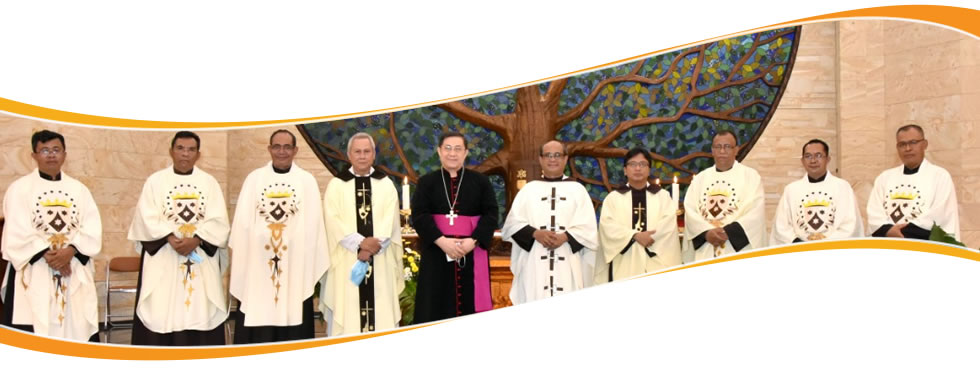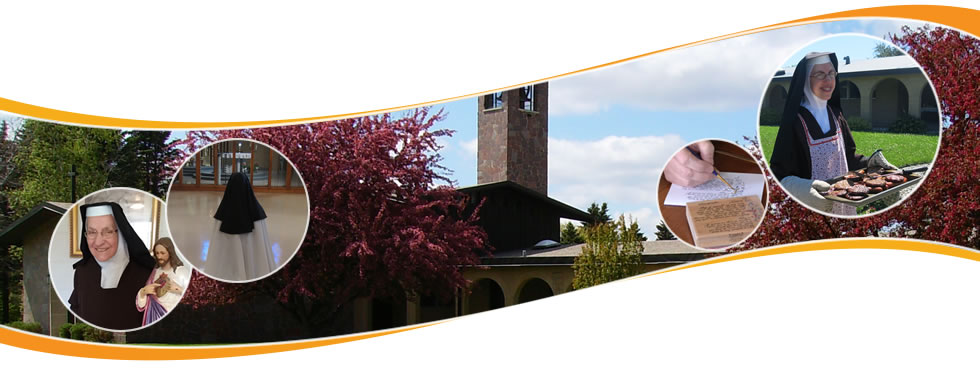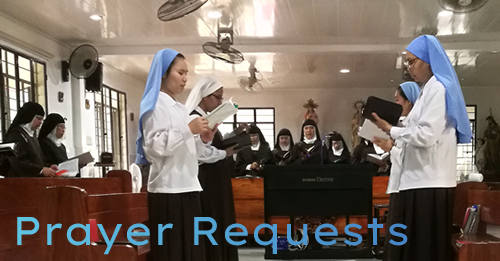Service among the people: the experience of God sends us into mission
Participants in Christ’s mission in the Church
A contemplative community’s authentic experience of God necessarily leads us to make our own “the mission of Jesus, who was sent to proclaim the Good News of the Kingdom of God and to bring about the total liberation of humanity from all sin and oppression. Our ministry as Carmelites is therefore an integral part of our charism.”
As Carmelites, we are in the Church and for the Church, and together with the Church we are at the service of the Kingdom.[1] While we strive to enrich the Church through the specificity of our charism, we cooperate in building the one body of Christ in full communion with all the other members of the Christian community[2]. This communion is made concrete by means of our involvement in local churches[3].
Serving those who seek God
Carmelites share in their contemporaries’ thirst for God. This thirst for spirituality goes beyond the limits of Christianity and is often to be found hidden even in those who profess no religion. As Carmelites, we must be able to recognize this thirst for spirituality, wherever it may be, and to enter into dialogue with anyone who seeks God, contributing to the discoveries individuals make in their own experience of the “holy places and mystical spaces” where God comes to meet us. Faithful to the Order’s spiritual heritage, we focus our work, in its various dimensions, on increasing the search for God, and we invite men and women of our time to the experience of contemplation, sharing with them the richness of our spiritual tradition. Our life as a contemplative community becomes a credible witness to the possibility of encountering the Other and others through silence, openness and sincere communication.
Brothers in the midst of the people
Communal life is in itself both a proclamation and a challenge[4]. A community that is full of life is both attractive and prophetic; it is a sign of the liberating presence of the Lord among his people.
Our lifestyle, which must be open and welcoming, invites us to share with others the communion of hearts and the experience of God which are lived within the community (Rule, 9).
This way of being “in the midst of the people” is a prophetic sign of a new way of relating with people - one that is based on friendship and fraternity. It is also a prophetic statement about justice and peace in society and among peoples. It is “a choice to share with ‘the little ones’ in history, a choice to speak a word of hope and of salvation from within, more through life than in words.”
Carmelites set out on a journey, following the guidelines given by the Rule, along the paths marked out by the Spirit of the Lord (Rule, 17). They become companions to those who suffer, hope and commit themselves to building up the Kingdom of God, and they seek to promote every means of fostering community.
Brothers in mission
We must learn “to ‘leave the sacred precincts’ and ‘go outside the camp’ in order to proclaim ‘in the new marketplaces of the world’ that God loves humankind with an everlasting tenderness.” Naturally, each situation requires a response that is appropriate to local needs and demands. Our lifestyle and our spirituality must be translatable into attitudes and actions capable of communicating our Carmelite spirit through an ongoing effort to inculturate our charism and the Gospel message. Moreover, every culture into which we integrate ourselves will enrich both our own understanding of the Gospel message and of our charism, and the means which express them; for as we evangelize, we are in turn evangelized. As we take Christ to others, we encounter Christ present in them.
Mission ad gentes
In obedience to Christ’s command to “go and teach all the nations, baptizing them in the name of the Father, the Son and the Holy Spirit, teaching them to observe my commands,” (Matthew 28:19-20) the Order recognizes and promotes the continuation of a long missionary tradition which reached its high point when Saint Thérèse of the Child Jesus was made patron saint of the missions, and is confident that “mission ad gentes will reveal in a new way the heart of the Carmelite charism.” “Missionary work is nothing other than the manifestation, or the epiphany and the realization, of God’s plan in the world and in history.”[5]. It is “the Church’s highest and most sacred duty,”[6] because the Church is missionary by nature.
From the Lord’s explicit command, from the Church’s many emphatic statements, and from the tradition of the Order, it is clear that, for Carmelites today, missionary work ad gentes is not merely a possibility but a real necessity, as well as a privilege. We must encourage and promote “the unsuppressable missionary drive which distinguishes and characterizes consecrated life.”[7]
Inculturation
The Carmelite charism reaches beyond cultural differences, because the search for God is the heart of the Carmelite vocation and is also the deepest desire of the human heart. In this journey we discover what unites us to God, to each other and to all creation. It is truly joyful in that through it we enter a unity in Christ where there is no longer, division or difference.[8]
Living at the centre of the world’s complexity, we are called to live the Gospel in unity.[9] We are an international Order, stretching across five continents in a global reality divided by language, national boundaries, race, wealth and poverty, differing ideologies, gods, and even different generation gaps. The call to unity is a gift in this diversity. The Church reminds us that we are one family.[10] What is essential for us in this multicultural reality is our common identity. Solid formation in our Christian and Carmelite identity is the sure foundation for dialogue, negotiation and acceptance of the other. In fact, Carmelite communities of today are often a mixture of cultures, nationalities and age groups. This globalization requires that we be well grounded in our own Carmelite culture, so that we have flexibility to embrace difference and an international worldview. The Gospel can appear in different clothing according to the different cultures, but it is the one Gospel.
We can no longer live as isolated realities, because events across the globe touch us, challenge us, engage us. The mendicant friar is not constrained by high walls, but enters the market place where many cultures interact. We are heirs to a great missionary tradition, opening our Order to new cultures and ideas, places where the “seed of Carmel has been planted.” The harvest is rich! For those in initial and ongoing formation programs, international experiences, exchange of personnel, diversity of way of life enriches the formation process and enables the Order to serve God’s people in our new multicultural society. Being open to diversity within the Order and in the greater society will enlighten the dialogue among ourselves and strengthen the common project of community living, which our Rule intimates.[11] “The Church…. travels the same journey as all humanity and shares the same earthly lot with the world: she is to be a leaven and, as it were, the soul of human society in its renewal by Christ and transformation into the family of God.”[12]
Prophets of justice and peace
The contemplative dimension of Carmelite life allows us to recognize God’s action in creation and in history. This free gift challenges us to commit ourselves to the working out of God’s plan for the world. The authentic contemplative journey allows us to discover our own frailty, our weakness, our poverty; in a word, the nothingness of human nature - reminding us that all is grace. Through this experience, we grow in solidarity with those who live in situations of deprivation and injustice. As we allow ourselves to be challenged by the poor and by the oppressed, we are gradually transformed, and we begin to see the world with God’s eyes and to love the world with his heart. With God, we hear the cry of the poor,[13] and we strive to share the Divine solicitude, concern, and compassion for the poorest and the least.
This moves us to speak out prophetically in the face of the excesses of individualism and subjectivism which we see in today’s mentality, especially in the face of the many forms of injustice and oppression of individuals and of peoples.
Commitment to justice, peace and the safeguarding of creation is not an option; these are urgent challenges, to which contemplative and prophetic Carmelite communities - following the example of Elijah[14] and Mary[15] - must respond, speaking out in explicit defense of the truth and of the divine plan for humanity and for creation as a whole. Our communal lifestyle is in itself such a statement: it is founded on just and peaceful relations, according to the plan outlined in the Rule,[16] which our tradition traces back to the experience of Elijah, who founded on Mount Carmel a community of justice and peace.[17]
Keeping alive the memory of Mary
The rediscovery of the Marian tradition in Carmelite spirituality inspires us today to offer the humble service of those who attribute to Mary, primary model of discipleship, a specific role in spiritual and ecclesial life. This involves promoting an authentic renewal of Mariology on solid biblical, liturgical, ecumenical and anthropological foundations.[18] In addition, we need to look more critically at our Marian tradition, in order to find a new language and new ways of expressing our relationship with Mary on our spiritual journey.
Source: Ratio Institutionis Vitæ Carmelitanæ, 45-50, 52-53.
[1] Love for the Church and for its mission is a constant element of Carmel. Only a few of the numerous references are mentioned here; e.g., Saint Mary Magdalene de’Pazzi, Renovazione della Chiesa, Saint Thérèse of the Child Jesus, Story of a Soul, Ms. B., 2v-3v.
[2] cf. Vita consecrata, 31, 46-56.
[3] cf. Vita consecrata, 48-49.
[4] Fraternal life, 54-56, Vita consecrata 51.
[5] Ad gentes, 9.
[6] Ad gentes, 29.
[7] Vita consecrata, 77.
[8] see Galatians 3:27-28.
[9] see John 17:11.
[10] Ad gentes, 22: “... the local traditions together with the special qualities of each national family, illumined by the light of the Gospel, will be taken up into a Catholic unity.”
[11] see Rule, 15.
[12] see Gaudium et spes, 1965, Pastoral Constitution of the Church in the Modern World, 42, §6; and also Catechism of the Catholic Church, 854.
[13] see Isaiah 3:7.
[14] see 1 King 21.
[15] see Luke 1:46-55.
[16] see Rule, 21.
[17] see Institutio primorum monachorum, 3:3, 5.
[18] see Marialis cultus, 29-39; for biblical aspects, see Saint Thérèse of the Child Jesus, Last Conversations, 21 August, 3; the poem, Why I Love You, O Mary! (PN 54).
































